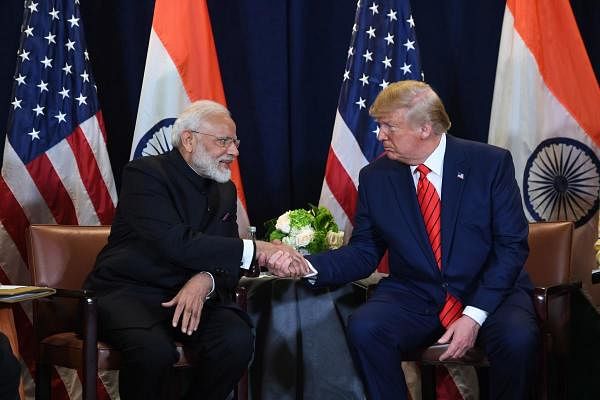
With the United States' President, Donald Trump, set to tour Ahmedabad, Agra and New Delhi next week, India hopes that he will not hurt its sensitivities again by reiterating during the visit his offer to help settle its dispute with Pakistan over Jammu and Kashmir.
Pakistan already called upon United States President to take "some concrete practical steps" during his visit to India to "take forward" his offer to play the role of a mediator between the two South Asian nations and help them settle the outstanding issues, including the dispute over Jammu and Kashmir (J&K).
New Delhi, however, stated that it would hope that US President would keep in mind the reservation of his host on the involvement of “any third party” to settle the dispute over J&K.
"Our sensitivities and concerns are well known (to the US) and we do hope that during the visit (by the US President) things will go on smoothly," Raveesh Kumar, spokesperson of the Ministry of External Affairs (MEA), told journalists in New Delhi. He was replying to a question on the possibility of US President once again offering to mediate between India and Pakistan and New Delhi's preparedness to deal with such an eventuality.
The US President has been repeatedly indicating over the past few months his willingness to intervene in the dispute over Kashmir. New Delhi strongly rejected his offers in the past – underlining that the 1972 Simla Agreement between India and Pakistan and the 1999 Lahore Declaration by the leaders of the two nations had left no scope for any third party to play any role in settling outstanding disputes between the two South Asian neighbours.
Trump, however, reiterated his offer just before he had a meeting with Pakistan Prime Minister Imran Khan on the sideline of the World Economic Forum at Davos in Switzerland on January 22.
Also read — Donald Trump remains excited for grand reception in India as New Delhi tries to temper expectations
The US President's offers irked New Delhi but elated the Khan government in Islamabad, which over the past few months stepped up its diplomatic campaign to internationalise its disputes with India, particularly after Prime Minister Narendra Modi's government on August 5 last year moved to strip Jammu and Kashmir of its special status and reorganise the state into two Union Territories.
"We hope that during the US President’s visit to India the issues being faced by the people of Indian occupied Jammu and Kashmir will be raised with the Government of India and his offer of mediation is taken forward through some concrete practical step," Aisha Farooqui, spokesperson of the Ministry of Foreign Affairs of Pakistan Government, said in Islamabad on Thursday.
New Delhi, however, tacitly conveyed to the Trump administration over the past few days that if US President reiterated his offer of mediation during his visit, it would not go down well with India.
"Our position is very well known to the US side. And, time and again, we have communicated it to them, not only (in our interaction) with the US Congress, but also with the US State Department and the White House," Kumar, spokesperson of the MEA, said on Thursday.
The US endorsed India’s position that its August 5, 2019 decisions on Jammu and Kashmir were its internal affairs. But Trump administration has been nudging New Delhi to fully restore access to the internet and lift other restrictions imposed on people of Jammu and Kashmir as well as to set free the detained political leaders. Several members of the US Congress too expressed concern over the purported violation of human rights of the people of Jammu and Kashmir.
Two US Congressmen – Ami Bera of Democratic Party and George Holding of Republican Party – were on a tour to New Delhi on the eve of American President’s visit and they expressed concern over the continued detention of political leaders of Jammu and Kashmir. They called upon the Modi government to allow a delegation of the US Congress to visit Kashmir.
Besides, four American Senators – Chris Van Hollen and Dick Durbin of Democratic Party and Todd Young and Lindsey Graham of Republican Party – recently wrote to US Secretary of State Mike Pompeo, expressing concern, not only over the situation in Jammu and Kashmir but also over the new Citizenship (Amendment) Act, which triggered protests across India.
Kenneth Juster, US ambassador to India, was among the 25 foreign envoys the Modi government recently took on a tour to Jammu and Kashmir so that they could "witness for themselves progressive normalisation of the situation".
Trump will arrive in Ahmedabad around noon on Monday to commence his maiden visit to India as President of the United States. He and Prime Minister Narendra Modi will address a rally of about one lakh people at a newly-built stadium in the city. He and his wife Melania Trump, who will accompany him during the tour, will visit Taj Mahal in Agra just before sunset.
The President and the First Lady of the US will arrive in New Delhi late in the evening on Monday. PM Modi and Trump will hold formal meetings at Hyderabad House in the national capital on Tuesday.
